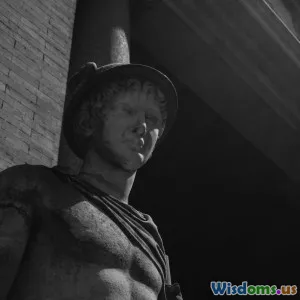
Understanding Modern Secret Organizations
7 min read Explore the hidden world of modern secret organizations and their impact on society. (0 Reviews)
Understanding Modern Secret Organizations
Secret organizations have long captured human imagination, conjuring images of mysterious societies wielding hidden power. While the past is rich with tales of clandestine brotherhoods, modern secret organizations continue to thrive in the shadows of our global society. Their roles have evolved, and understanding their nature sheds light on complex social, political, and cultural phenomena.
Introduction: Why Modern Secret Organizations Matter
The allure of secret organizations lies in mystery, exclusivity, and sometimes conspiracy. But beyond intrigue, these groups often influence critical facets of life, from political decisions to cultural trends. In today’s interconnected world, it’s vital to separate myth from reality and grasp how such organizations operate, why they persist, and what implications they hold.
Defining Modern Secret Organizations
A secret organization can be broadly understood as an association whose membership, aims, or activities are concealed from public eyes. Unlike open clubs or societies, these groups maintain secrecy through coded communications, rituals, or selective disclosure.
Modern secret organizations can be categorized into:
- Social and fraternal orders: Such as Freemasons or Odd Fellows who blend social networking with tradition.
- Political or ideological groups: Organizations pursuing covert strategies to influence governments or societies.
- Corporate and intelligence entities: Where operational secrecy protects competitive advantage or national security.
Example: The Freemasons Today
The Freemasons, one of the oldest fraternal organizations, remain an active secret society. Their rituals and symbols are closely guarded although the organization strives for transparency in its charitable works. With over 6 million members worldwide, their network spans influential figures from politics to business, underscoring their enduring appeal and influence.
The Evolution of Secrecy in Organizations
Historically, secret societies often evolved as protective or revolutionary groups. For example, the Carbonari in 19th-century Italy channeled secret organization toward national independence. Nowadays, secrecy may serve strategic or privacy purposes in a fast-evolving digital age.
From Face-to-Face to Cyber:
With the internet, secrecy is challenged yet simultaneously enhanced. Some organizations now operate through encrypted communication channels, making infiltration or exposure increasingly difficult. Hackers, whistleblowers, and investigative journalism continue to unveil activities that once remained entirely hidden.
Purposes and Motivations Behind Secrecy
Protection and Privacy
Many organizations use secrecy to protect members from external persecution or abuse, especially where their activities might be misunderstood or opposed. For example, underground resistance groups during oppressive regimes often had to remain covert.
Power and Influence
Secrecy may also serve as a tool to accumulate and wield power discreetly. Controlling information flow can provide leverage in political or economic arenas.
Tradition and Mystique
Some societies maintain secrecy to preserve tradition, rituals, and group cohesion, enhancing the sense of belonging among members.
Real-World Insights and Contemporary Examples
Intelligence Agencies
Agencies such as the CIA, MI6, or FSB operate with levels of secrecy necessary for national security. While government-sanctioned, their secrecy fuels speculation and controversy around legitimacy and accountability.
Corporate Espionage Groups
In the business world, secretive groups may exist to protect trade secrets or engage in industrial espionage. The infamous example includes allegations of spying between tech giants competing for market dominance.
Anonymous and Hacktivist Circles
Groups like Anonymous leverage anonymity to conduct hacktivism, pushing social and political agendas through digital disruption. Their decentralized and secretive nature makes them modern digital secret organizations.
The Impact on Society and Ethics
Balancing Transparency and Secrecy
Modern democracies emphasize transparency, yet some secrecy is necessary for privacy, security, and competitive advantage. Striking the right balance remains an ongoing societal challenge.
Ethical Questions
With influence often undetected by the public eye, secret organizations raise ethical questions regarding accountability, democratic oversight, and human rights.
Public Perception and Myths
Misunderstandings fuel conspiracy theories that can harm social trust and lead to misinformation. Critical thinking and investigative efforts help demystify these entities.
How to Approach Information About Secret Organizations
- Analyze credible sources.
- Understand historical context.
- Beware of sensationalism.
- Seek transparency where possible.
Conclusion: The Continuing Relevance of Modern Secret Organizations
While the age of shadowy, omnipotent secret societies may be largely mythical, modern secret organizations remain relevant and impactful. They operate across social, political, and economic dimensions—often hidden, but far from powerless. By understanding their nature and complexity, individuals gain insight into broader societal mechanisms and a clearer perspective on information integrity.
Exploring these groups encourages vigilance, critical thinking, and deeper inquiry into the structures shaping our world.
References
- Jain, R. (2018). Secret Societies: The Power Behind the Scenes. New York: Insight Press.
- Knight, P. (2020). Behind the Veil: Modern Intelligence Operations. London: Policy Focus.
- Masonic World Review (2023). The History and Relevance of Freemasonry Today.
- Smith, L. (2021). "The Digital Underground: Hacker Groups in the 21st Century." Cybersecurity Journal, 45(2), 124-138.
This article aims to illuminate the complexities of modern secret organizations offering readers a nuanced understanding beyond sensational myths.
Rate the Post
User Reviews
Popular Posts





















